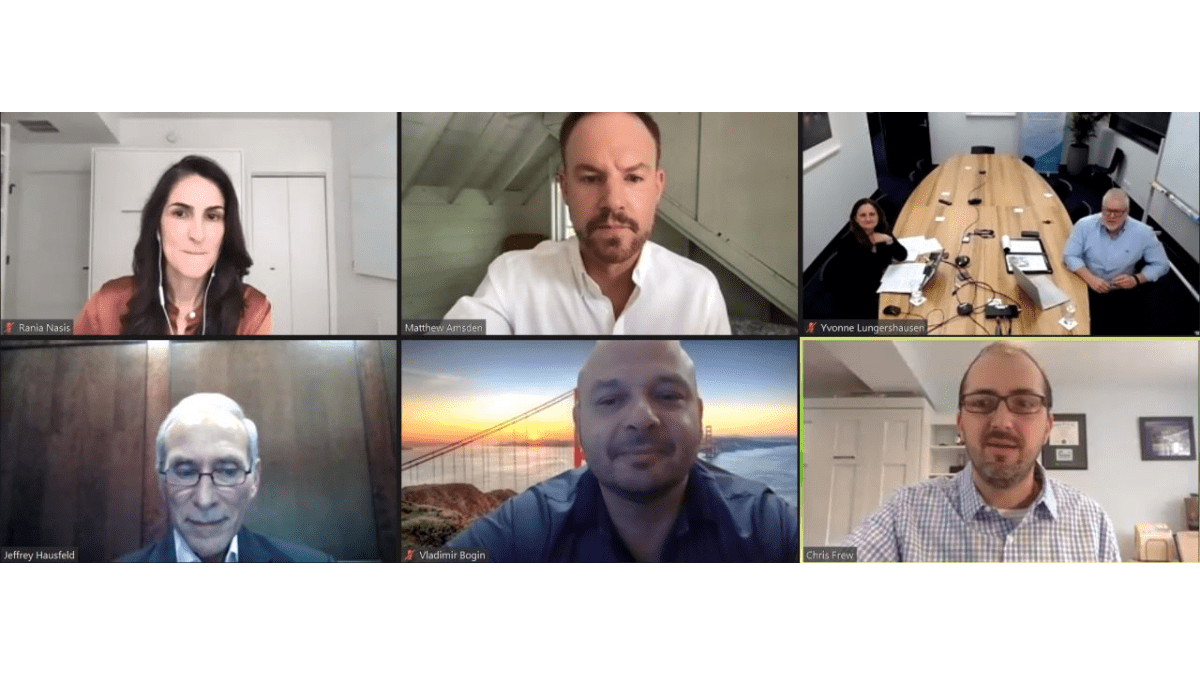
Top Insights on International Site Selection for Your Pivotal Clinical Trials
The pandemic has caused the cancellations and delays of clinical trials, making it even more challenging to effectively plan, design, and execute clinical trials, especially for emerging companies. The Society of Physician Entrepreneurs (SoPE) and BioBuzz hosted a live-virtual panel discussion to learn about industry best practices for running clinical trials, including how to make a critical choice: selecting the best geographical location to conduct a trial.
Panelists included Mike Burfield, National R&D Tax Partner, Team Leader at the consulting firm Bentleys Adelaide, Yvonne Lungershausen, the CEO of the Contract Research Organization (CRO) Avance Clinical; Matthew Amsden, the CEO of ProofPilot, a clinical trial design platform company; and Dr. Vlad Bogin, Founder, and CEO of the CRO Cromos Pharma.
The program, “Where in the World Should I Conduct My Pivotal Trial,” was organized by The Society of Physician Entrepreneurs (SoPE), and produced in collaboration with WorkForce Genetics. Dr. Jeffrey Hausfeld, Chairman and Co-Founder of SoPE and the Chief Medical Officer and Chairman of the Board at Frederick, Maryland’s emerging biosimilars company BioFactura co-moderated the event along with Dr. Rania Nasis, Director at SoPE and New York Tristate Chapter Co-Leader and the CEO of Starlings, a startup advisory company.
“There are so many wheels and cogs that you have to mesh together to get clinical trials to work, we thought having a panel to help understand these processes would help people avoid making common mistakes,” stated Dr. Hausfeld.
“Part of our mission at SoPE is to educate but also to also arm you with the tools you need to ask the right questions. If you’re considering clinical trials at some point in the future we hope you walk away from smarter and able to have the right conversations,” stated Nasis to kick off the webinar.
Here are some of the key take-aways. For the full conversation, you can watch the complete webinar recording here:
Conducting Trials Overseas Can Mitigate COVID-19 Risks
Lungershausen and Bogin, both leaders of CROs., made the case that U.S. biotechs and life science companies can conduct viable clinical trials at locations outside of the U.S. Choosing to conduct a clinical trial in Australia, where Lungerhausen’s company is located, or at Central and Eastern European sites, which is a focus of Bogin’s Cromos Pharma, can be faster and more affordable while producing valid data acceptable to U.S. and European Union (EU) regulatory bodies.
“There are a number of reasons why global companies come and do their early phase clinical work in Australia…There are significant advantages, one of which is the time to which it takes to start a trial. The Australian regulatory process is very streamlined and allows a fast start up. You also don’t need to have an in-country IND in place to get clinical data; a lot of U.S. companies come to Australia to get their clinical data to support their IND or to make go-no-go decisions. About 60% of our clientele are U.S. biotech companies,” stated Lungerhausen.
Bogin presented a mini-case study of a clinical trial that was struggling to manage delays and challenges caused by the pandemic. By expanding the number of clinical trial sites into Central and Eastern Europe where recruiting is easier, cost is more reasonable and there is a surplus of strong clinical trial workforce talent, Cromos was able to reduce cost overages from 36% to about 6% while preserving the original clinical trial timeline of about 25 months.
Bogin suggested that clinical trial “business as usual” is still about a year away and that those companies that aggressively expand their clinical trial sites, increase remote/virtual trial activities and act fast will succeed.
Tax incentives are another benefit of conducting clinical trials overseas.
“One of our areas of specialization is helping foreign-owned and controlled companies to establish a presence in Australia to manage clinical investments and then claim the R&D tax incentive or the R&D rebate. This is a program that enables companies to get a rebate of 43.5 cents per dollar spent on clinical work in Australia,” stated Mark Burfield, National R&D Tax Partner at Bentleys, a large tax and accounting advisory firm located in Australia.
COVID-19 is Accelerating Virtual/Remote Clinical Trial Activity
Much like telemedicine, the pandemic has accelerated the adoption of remote/virtual clinical trial practices. Prior to COVID-19, telemedicine adoption was developing steadily and slowly; however, the pandemic opened the proverbial floodgates for more widespread telemedicine adoption. This same trend is emerging in clinical trial design during the pandemic.
“In 2019 we did four trials, in January 2020 we expected four to eight major trials over the year, and then March happened and we are now launching one FDA-regulated trial a week. That gives you an idea of how remote trials are accelerating…I think it is inevitable that trials will move to a remote or hybrid approach,” stated ProofPilot’s Amsden.
“Participants, CROs, pharmaceutical companies and investors like it. It is accelerating something that folks thought was a scary experiment prior to all this, then it became the only way to conduct trials and now folks feel it’s really not so scary anymore so let’s continue,” he added.
Amsden stated that 70% of its clinical trials are totally remote. He also added that hybrid trials, where some activities are remote and some are in person, are also ongoing. He suggested that the pandemic has forced clinical trial designers to rethink protocols where virtual and in-person trial activities are matched and make sense for the patient and the company running the trial.
The bottom line is that like telemedicine, virtual/remote clinical trial designs are here to stay.
COVID-19 Has Pushed Clinical Trial Recruitment and Execution Toward a Hybrid Model
Recruiting for clinical trials is always challenging, but finding willing patients for trials has become exponentially more difficult because of the pandemic.
“I think there is going to be a balance between remote and having touch points with a site…I think regulators have had to pivot quickly…but I think they will eventually pull back. What COVID has done is make us think a lot more broadly about the opportunity to do things remotely and to use electronic technology to access patients that otherwise would not come into a trial because they are too remote…It’s not a fit for all, it is a fit for purpose type scenario,” stated Lungershausen.
Bogin added, “We got stopped in March and were idling for a couple of months and this forced us to go into remote monitoring. We were lucky enough to get several COVID trials on board and they were totally remote. The whole paradigm shift is happening. There will be more remote and device-driven activities; it will come to a hybrid model. You can’t do a remote cancer treatment, so there will be a lot of interface between technology and human visits.”
“One issue we are still trying to address fully is source data verification…Unblinded data cannot be fully transported. There are solutions now that are becoming more available and the quality of trial data is of concern right now. There is definitely a paradigm shift ongoing in how we do clinical trials,” he added.
Even during this paradigm shift, outreach and building a referral network for clinical trial recruitment are still critical to conducting effective clinical trials.
“You have to think like a media entity. You have to think like a social media influencer about what my audience is going to be interested in,” stated Amsden.
Strong Vetting of Clinical Trial Vendors Has Never Been More Important
As clinical trial design continues to transform into a hybrid model that blends virtual/remote activities with in person interactions, clinical trial vendors have had to pivot and adjust to this new reality. Companies seeking clinical trial support from vendors must know how to perform effective due diligence in order to identify vendors that are capable of functioning in a hybrid clinical trial model.
“It’s really important to assess a region and there is a lot of uncertainty…it’s really about pivoting, adapting, changing and trying to be nimble and as a service provider it’s about giving confidence to your sponsors that you can do that,” shared Lungershausen.
“If we are giving advice to biotech entrepreneurs, given the uncertainty out there, go wide or at least assess widely…what we’ve seen in North American is that there is a significant slow down…so go to Europe, go to Eastern Europe, Australia…go to places that are suitable to your indication, budget and therapy and definitely assess widely,” shared Bogin.
“You need local experts. You go to the EU, regulatory is different…or Poland or Ukraine or Russia…it’s a very different set of rules. At the end of the day, it is all manageable, but you need to know the specifics…and that has very good local expertise in those countries. What is also important for biotech entrepreneurs to know is that most companies are willing to do free feasibility work for you. We can dissect it for you; you can get a realistic picture and that will help them make a good decision” about where to conduct trials, he added.
Miscellaneous Clinical Trial Tips from the Panel
Amsden stated that vetting clinicians and physicians’ comfort with technology has become very important as clinical trials move toward a hybrid (virtual/in person) model.
Bogin, Amsden and Lungershausen all advised biotechs to come to CROs early in your protocol. CROs can add a lot of value to make sure your protocol effectively translates into an actual clinical trial environment. Find a trusted partner to help make sure your trial design is optimized.
Burfield offered that the Australian R&D tax incentive is very real and there are hundreds of companies taking advantage of this, but getting advice on proper setup is critical.
- About the Author
- Latest Posts
Steve brings nearly twenty years of experience in marketing and content creation to the WorkForce Genetics team. He loves writing engaging content and working with partners, companies, and individuals to share their unique stories and showcase their work. Steve holds a BA in English from Providence College and an MA in American Literature from Montclair State University. He lives in Frederick, Maryland with his wife, two sons, and the family dog.





